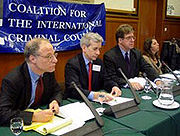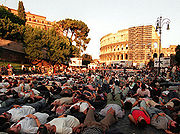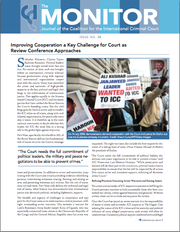
Coalition for the International Criminal Court
Encyclopedia
The Coalition for the International Criminal Court (commonly known as CICC) is an international non-governmental organisation
(NGO) with a membership of over 2,500 organizations worldwide advocating for a fair, effective and independent International Criminal Court
(ICC.Coalition NGO members work in partnership to strengthen international cooperation with the ICC; ensure that the court is fair, effective and independent; make justice both visible and universal, and advance stronger national laws that deliver justice to victims of war crimes, crimes against humanity and genocide. The CICC is a project of the World Federalist Movement
-Institute for Global Policy (WFM-IGP) and has secretariats in New York City, near the United Nations (UN), and in The Hague, The Netherlands. Additionally, the CICC has regional offices in Argentina
, Belgium
, Benin
, the Democratic Republic of Congo, Jordan
, Lima
and the Philippines
.
 A core group of well-known and respected NGOs form the informal Steering Committee of the Coalition and determine the CICC’s goals. Adapting and adjusting to political developments, the Steering Committee helps guide the work of the Coalition’s Secretariat, serving as an advisory body not only to provide global policy coherence, but to ensure cooperation and provide crucial strategic oversight. Each of these organisations has its own ICC programs, staff and resources.
A core group of well-known and respected NGOs form the informal Steering Committee of the Coalition and determine the CICC’s goals. Adapting and adjusting to political developments, the Steering Committee helps guide the work of the Coalition’s Secretariat, serving as an advisory body not only to provide global policy coherence, but to ensure cooperation and provide crucial strategic oversight. Each of these organisations has its own ICC programs, staff and resources.
Steering Committee members include:
By 2009, there were 14 national coalitions in Asia
and the Pacific, 14 in Europe
, 21 in Africa
, 11 in the Middle East
and North Africa
, and 9 in Latin America
, for a total of 69 national coalitions advocating for the ICC.
The CICC Secretariat's Regional Section, its Regional Coordinators based around the world and its Outreach Liaisons in New York
, support the development and capacity-building of the CICC networks and work closely with them at every stage.
Currently these include topics such as:
Purpose
 Background
Background
In particular, the Coalition has Universal Ratification Campaign (URC) which focuses on one country each month, rotating to a different region each time. As part of this major campaign, members in every region are encouraged to redouble efforts in order to ensure universal acceptance of the ICC. Local actions are needed to promote awareness of the International Criminal Court, increase media coverage, urge governments to ratify the Rome Statute, adopt effective implementing legislation, and ratify the Agreement on Privileges and Immunities.
The CICC also campaigns for implementation of all of the crimes under the Rome Statute into domestic legislation. As the Court initiates new investigations, the existence of solid cooperation and implementing legislation has taken on further urgency.
In addition, the CICC is urging States to ratify and implement the Agreement on Privileges and Immunity of the ICC (APIC), designed to provide officials and staff of the ICC with certain privileges and immunities necessary for them to perform their duties in an independent and unconditional manner, and to guarantee that their officials are aware of the actual scope and realities of these privileges and immunities and how to apply them in concrete situations.
Tens of thousands of copies of our print resources are distributed worldwide to government representatives, international organizations, academics, civil society groups, and individuals. They provide updates on developments at the Court as well as at the Assembly of States Parties; reports on ICC-related events worldwide; details on new resources and upcoming events; and information about key issues related to the International Criminal Court.
CICC's publication The Monitor
• The CICC Bulletin is a bi-monthly online publication featuring updates on the work of the ICC and CICC, as well as on the progress of the four situations currently before the court. It is published in English, French, and Spanish.
• The MENA Update is a bi-annual online newsletter in Arabic providing updates on ICC -related issues in the Middle East and North Africa.
• The Europe Update is a bi-annual online newsletter with information on the latest ICC- related events in Europe.
• The Africa Update is a bi-annual online newsletter focused on ICC developments in Africa.
 In Situ Blog
In Situ Blog
• The Asia Update is a biannual online newsletter with information on ICC- related developments in Asia.
• The CICC blog “In Situ – See justice through the eyes of civil society”: In Situ is Latin for “in the natural place.” This term refers to the idea of bringing international justice and trial proceedings home to affected communities. The Coalition’s blog endeavors to help bridge the gap between the populations affected by the crimes under the Court’s investigation and the ICC’s daily activities at its headquarters in The Hague. In Situ features posts by some of the more than 2,500 members in 150 countries around the world.
In addition to these publications and the CICC website (www.iccnow.org), the Coalition’s electronic resources include information email lists in English, French, Spanish, and Portuguese to which daily postings are made. Summaries of all news coverage of the ICC, information on new ratifications of the Statute and progress towards ratification, announcements of upcoming events, notes and reports on the Assembly of States Parties, and other critical information is made available through these lists.
(See Chapter 5: NGOs-Advocates, Assets, Critics, and Goads)
(See Chapter 5: Negotiations: NGOs Shape the Terms of ICC Debate: 1995-1998)
Non-governmental organization
A non-governmental organization is a legally constituted organization created by natural or legal persons that operates independently from any government. The term originated from the United Nations , and is normally used to refer to organizations that do not form part of the government and are...
(NGO) with a membership of over 2,500 organizations worldwide advocating for a fair, effective and independent International Criminal Court
International Criminal Court
The International Criminal Court is a permanent tribunal to prosecute individuals for genocide, crimes against humanity, war crimes, and the crime of aggression .It came into being on 1 July 2002—the date its founding treaty, the Rome Statute of the...
(ICC.Coalition NGO members work in partnership to strengthen international cooperation with the ICC; ensure that the court is fair, effective and independent; make justice both visible and universal, and advance stronger national laws that deliver justice to victims of war crimes, crimes against humanity and genocide. The CICC is a project of the World Federalist Movement
World Federalist Movement
The World Federalist Movement is a global citizens movement with member and associate organizations around the world. The WFM International Secretariat is based in New York City across from the United Nations headquarters...
-Institute for Global Policy (WFM-IGP) and has secretariats in New York City, near the United Nations (UN), and in The Hague, The Netherlands. Additionally, the CICC has regional offices in Argentina
Argentina
Argentina , officially the Argentine Republic , is the second largest country in South America by land area, after Brazil. It is constituted as a federation of 23 provinces and an autonomous city, Buenos Aires...
, Belgium
Belgium
Belgium , officially the Kingdom of Belgium, is a federal state in Western Europe. It is a founding member of the European Union and hosts the EU's headquarters, and those of several other major international organisations such as NATO.Belgium is also a member of, or affiliated to, many...
, Benin
Benin
Benin , officially the Republic of Benin, is a country in West Africa. It borders Togo to the west, Nigeria to the east and Burkina Faso and Niger to the north. Its small southern coastline on the Bight of Benin is where a majority of the population is located...
, the Democratic Republic of Congo, Jordan
Jordan
Jordan , officially the Hashemite Kingdom of Jordan , Al-Mamlaka al-Urduniyya al-Hashemiyya) is a kingdom on the East Bank of the River Jordan. The country borders Saudi Arabia to the east and south-east, Iraq to the north-east, Syria to the north and the West Bank and Israel to the west, sharing...
, Lima
Lima
Lima is the capital and the largest city of Peru. It is located in the valleys of the Chillón, Rímac and Lurín rivers, in the central part of the country, on a desert coast overlooking the Pacific Ocean. Together with the seaport of Callao, it forms a contiguous urban area known as the Lima...
and the Philippines
Philippines
The Philippines , officially known as the Republic of the Philippines , is a country in Southeast Asia in the western Pacific Ocean. To its north across the Luzon Strait lies Taiwan. West across the South China Sea sits Vietnam...
.
History
The Coalition was founded in 1995 by a small group of NGOs that coordinated their work to ensure the establishment of an International Criminal Court. Since then, the Coalition's membership has increased exponentially as its original goal of establishing the ICC grew to include the larger goal of guaranteeing the Court's fair, effective and independent functioning. Over the years, the Coalition Secretariat and its global membership have worked together at every stage of the Court's development from the preparatory committees for the establishment of the Court, to the Rome Conference that established the Court to the annual Assembly of States Parties meetings. Milestones in the Coalition’s work include the participation in and monitoring of the 1998 Rome conference, resulting in the adoption of the Rome Statute of the ICC; the Statute’s rapid entry into force on July 1, 2002; and the election of the Court’s senior officials, completed in June 2003. The role of the Coalition was recognized by the Assembly of States Parties when it adopted a resolution entitled ‘Recognition of the coordinating and facilitating role of the NGO Coalition for the International Criminal Court’ (ICC-ASP/2/Res.8) during its second session in September 2003.Steering Committee
Representatives of CICC Steering Committee members (from l-r) Richard Dicker (HRW), Christopher Hall (AI) and Jeanne Sulzer (FIDH) (far right), pictured here with CICC Convenor William Pace.
Steering Committee members include:
- Amnesty InternationalAmnesty InternationalAmnesty International is an international non-governmental organisation whose stated mission is "to conduct research and generate action to prevent and end grave abuses of human rights, and to demand justice for those whose rights have been violated."Following a publication of Peter Benenson's...
- Asociación Pro Derechos Humanos
- Fédération Internationale des Ligues des Droits de l'Homme
- Human Rights FirstHuman Rights FirstHuman Rights First is a nonprofit, nonpartisan human rights organization based in New York City and Washington, D.C....
- Human Rights WatchHuman Rights WatchHuman Rights Watch is an international non-governmental organization that conducts research and advocacy on human rights. Its headquarters are in New York City and it has offices in Berlin, Beirut, Brussels, Chicago, Geneva, Johannesburg, London, Los Angeles, Moscow, Paris, San Francisco, Tokyo,...
- No Peace Without JusticeNo Peace Without JusticeNo Peace Without Justice or Non C'è Pace Senza Giustizia is an Italian non-profit organization, founded in 1993 by Emma Bonino, an Italian politician, former Member of the European Parliament and current Member of the Italian Senate...
- Parliamentarians for Global ActionParliamentarians for Global ActionParliamentarians for Global Action is a non-profit and non-partisan international organization of more than 1,300 free elected legislators from 130 democratic countries . It was established circa 1978 as Parliamentarians for World Order engaged in a range of action-oriented initiatives that promote...
- Women's Initiatives for Gender Justice
- World Federalist MovementWorld Federalist MovementThe World Federalist Movement is a global citizens movement with member and associate organizations around the world. The WFM International Secretariat is based in New York City across from the United Nations headquarters...
- Emeritus Steering Committee Members: European Law Students' Association
- Rights and Democracy
- Asian Forum for Human Rights and DevelopmentAsian Forum for Human Rights and DevelopmentThe Asian Forum for Human Rights and Development is a membership-based human rights organization "committed to the promotion and protection of all human rights including the right to development". They were founded in 1991 in Manila, and are now based in Geneva, Switzerland. Their Secretariat...
(FORUM-ASIA) – Bangkok, Thailand - Civil Resource Development and Documentation Centre (CIRDDOC) – Enugu, Nigeria
- Comisión Andina de Juristas (Andean Commission of Jurists) – Lima, Peru
- Human Rights Network-Uganda (HURINET-Uganda) – Kampala, Uganda
- The Redress Trust – London, United Kingdom
Membership
In 1995, the CICC consisted of 25 member organizations, but today—with a global membership of more than 2500 organizations—the Coalition has become a major actor in the global fight to end impunity. Coalition members represent vast geographic and thematic interests, including human rights, women’s issues, children’s rights, peace, international law, humanitarian assistance, the rights of victims, faith-based issues and disarmament.Regional and National Networks
The Coalition for the ICC has established strong national and regional networks all over the world. The CICC national coalitions and regional networks typically comprise a diverse range of civil society groups working within a single country or region, including NGOs, academics, lawyers, bar associations and others. Through these networks, strategic plans to achieve the goals of this campaign, in particular ratification and implementation of the Rome Statute, and widespread education about the Court and the Statute, are developed and carried out.By 2009, there were 14 national coalitions in Asia
Asia
Asia is the world's largest and most populous continent, located primarily in the eastern and northern hemispheres. It covers 8.7% of the Earth's total surface area and with approximately 3.879 billion people, it hosts 60% of the world's current human population...
and the Pacific, 14 in Europe
Europe
Europe is, by convention, one of the world's seven continents. Comprising the westernmost peninsula of Eurasia, Europe is generally 'divided' from Asia to its east by the watershed divides of the Ural and Caucasus Mountains, the Ural River, the Caspian and Black Seas, and the waterways connecting...
, 21 in Africa
Africa
Africa is the world's second largest and second most populous continent, after Asia. At about 30.2 million km² including adjacent islands, it covers 6% of the Earth's total surface area and 20.4% of the total land area...
, 11 in the Middle East
Middle East
The Middle East is a region that encompasses Western Asia and Northern Africa. It is often used as a synonym for Near East, in opposition to Far East...
and North Africa
North Africa
North Africa or Northern Africa is the northernmost region of the African continent, linked by the Sahara to Sub-Saharan Africa. Geopolitically, the United Nations definition of Northern Africa includes eight countries or territories; Algeria, Egypt, Libya, Morocco, South Sudan, Sudan, Tunisia, and...
, and 9 in Latin America
Latin America
Latin America is a region of the Americas where Romance languages – particularly Spanish and Portuguese, and variably French – are primarily spoken. Latin America has an area of approximately 21,069,500 km² , almost 3.9% of the Earth's surface or 14.1% of its land surface area...
, for a total of 69 national coalitions advocating for the ICC.
The CICC Secretariat's Regional Section, its Regional Coordinators based around the world and its Outreach Liaisons in New York
New York
New York is a state in the Northeastern region of the United States. It is the nation's third most populous state. New York is bordered by New Jersey and Pennsylvania to the south, and by Connecticut, Massachusetts and Vermont to the east...
, support the development and capacity-building of the CICC networks and work closely with them at every stage.
NGO Teams and Issues
The CICC monitors a wide range of issues relating to the work of the ICC through issue-specific teams and working groups composed of NGO representatives. Membership to these teams is open to all CICC members.Currently these include topics such as:
- Budget and Finance
- Building - ICC Premises
- Children
- Communications and Outreach
- Cooperation Agreements and Enforcement
- Crime of Aggression
- Gender Justice
- Legal Representation
- Recruitment of ICC staff
- Review Conference
- Strategic Plan
- Trust Fund for Victims
Purpose
- The key purpose of the teams is to help coordinate and focus the input of member NGOs on particular issues, and facilitate the efficient division of labor among NGO experts. Most teams have a designated leader and a CICC Secretariat focal point that helps coordinate the work. Teams operate on the principles of collaboration and transparency, and respect the diversity, mandates and independence of members. Teams monitor key developments related to their particular area of focus and recommend strategies to be considered by the Coalition as a whole or by individual members.

- The Coalition’s team structure developed informally during the 1995-1998 Ad Hoc and Preparatory Committee meetings leading up to the Rome Conference. The structure was formally implemented during the Rome Conference during which 13 teams monitored various aspects of the Statute, the Final Act and the Preamble. Throughout the Preparatory Commissions and the Assembly of States Parties, the teams worked in conjunction with the Coalition’s Steering Committee, sectoral caucuses, working groups such as the Faith and Ethics Network and the Victims’ Rights Working Group, and regional teams working on issues such as ratification and implementation as well as regional and national networks.
Regional Campaigns
The Coalition advocates for universal ratification of the Rome Statute of the ICC as it is a cornerstone objective to making the membership in the ICC truly global and universal. The CICC believes that in order for the Court to succeed, an increasing majority of the world’s nations must support the Court.In particular, the Coalition has Universal Ratification Campaign (URC) which focuses on one country each month, rotating to a different region each time. As part of this major campaign, members in every region are encouraged to redouble efforts in order to ensure universal acceptance of the ICC. Local actions are needed to promote awareness of the International Criminal Court, increase media coverage, urge governments to ratify the Rome Statute, adopt effective implementing legislation, and ratify the Agreement on Privileges and Immunities.
The CICC also campaigns for implementation of all of the crimes under the Rome Statute into domestic legislation. As the Court initiates new investigations, the existence of solid cooperation and implementing legislation has taken on further urgency.
In addition, the CICC is urging States to ratify and implement the Agreement on Privileges and Immunity of the ICC (APIC), designed to provide officials and staff of the ICC with certain privileges and immunities necessary for them to perform their duties in an independent and unconditional manner, and to guarantee that their officials are aware of the actual scope and realities of these privileges and immunities and how to apply them in concrete situations.
Supporters
Current major funding is provided by the European Union, the Ford Foundation, the John D. and Catherine T. MacArthur Foundation, and the Open Society Institute, as well as by the governments of Belgium, Denmark, Finland, Liechtenstein, the Netherlands, Norway, Sweden, and Switzerland, and a number of individual donors.Publication and Resources
The CICC has both electronic and print publications.Tens of thousands of copies of our print resources are distributed worldwide to government representatives, international organizations, academics, civil society groups, and individuals. They provide updates on developments at the Court as well as at the Assembly of States Parties; reports on ICC-related events worldwide; details on new resources and upcoming events; and information about key issues related to the International Criminal Court.
- The Monitor is a bi-annual journal on worldwide ICC-related updates worldwide mailed to all members of the ICC and other interested parties. It is published in English, French, and Spanish.
CICC's publication The Monitor
• The CICC Bulletin is a bi-monthly online publication featuring updates on the work of the ICC and CICC, as well as on the progress of the four situations currently before the court. It is published in English, French, and Spanish.
• The MENA Update is a bi-annual online newsletter in Arabic providing updates on ICC -related issues in the Middle East and North Africa.
• The Europe Update is a bi-annual online newsletter with information on the latest ICC- related events in Europe.
• The Africa Update is a bi-annual online newsletter focused on ICC developments in Africa.

• The Asia Update is a biannual online newsletter with information on ICC- related developments in Asia.
• The CICC blog “In Situ – See justice through the eyes of civil society”: In Situ is Latin for “in the natural place.” This term refers to the idea of bringing international justice and trial proceedings home to affected communities. The Coalition’s blog endeavors to help bridge the gap between the populations affected by the crimes under the Court’s investigation and the ICC’s daily activities at its headquarters in The Hague. In Situ features posts by some of the more than 2,500 members in 150 countries around the world.
In addition to these publications and the CICC website (www.iccnow.org), the Coalition’s electronic resources include information email lists in English, French, Spanish, and Portuguese to which daily postings are made. Summaries of all news coverage of the ICC, information on new ratifications of the Statute and progress towards ratification, announcements of upcoming events, notes and reports on the Assembly of States Parties, and other critical information is made available through these lists.
Further reading
(See Chapter 11: The Making of the ICC)(See Chapter 5: NGOs-Advocates, Assets, Critics, and Goads)
(See Chapter 5: Negotiations: NGOs Shape the Terms of ICC Debate: 1995-1998)

